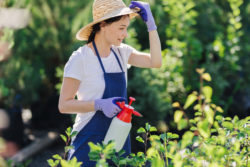Top Class Actions’s website and social media posts use affiliate links. If you make a purchase using such links, we may receive a commission, but it will not result in any additional charges to you. Please review our Affiliate Link Disclosure for more information.

Glyphosate is the active ingredient in Roundup, and has been identified as a “likely carcinogen” by both the World Health Organization and the State of California. So far, two lawsuits alleging that exposure to Roundup caused a form of cancer known as non-Hodgkin’s lymphoma (NHL) have resulted in verdicts for plaintiffs. Several thousand more lawsuits are currently pending in state and federal courts.
Board of Supervisors Recommends Moratorium
According to a local NBC news affiliate, the glyphosate moratorium was requested by Kathryn Barger, a member of the Los Angeles County Board of Supervisors. She asked the county government to “…stop the use of this herbicide [Roundup] until public health and environmental professionals can determine if it’s safe for further use.” She also asked the county to “explore alternative methods” for managing vegetation.
Barger’s recommendation comes in the wake of the latest outcome in ongoing glyphosate litigation, in which the jury unanimously sided with a 70-year-old plaintiff who claimed that he contracted NHL as a result of using Roundup for three decades.
Last August, a federal jury ordered Bayer to pay $289 million to a San Francisco Bay area groundskeeper who is dying from glyphosate cancer, although that jury award was later reduced by nearly 75 percent. The L.A. County Department of Public Works has 30 days to report how glyphosate has been used and recommend alternatives based on what other communities have done.
Other Jurisdictions Ban Glyphosate
As of last year, fourteen countries in the European Union, the Middle East and South America have either banned or severely restricted the used of glyphosate. Although the U.S. Food and Drug Administration has failed to take any meaningful action, individual states as well as towns and cities across the nation have taken a stand against the use of Roundup because of glyphosate cancer risk.
Bayer AG, which now holds the manufacturing rights to Roundup since its takeover of Monsanto last year, continues to insist that the chemical herbicide is “safe,” claiming that studies indicating Roundup’s carcinogenicity are “inconclusive.” Nonetheless, growing numbers of individuals and communities are choosing to “just say no” to Roundup.
Is Glyphosate Cancer a Real Danger?
While regulators in the US and Canada have been siding with Bayer in concluding that glyphosate is “harmless” to humans, the scientific community continues to find evidence to the contrary. This past February, a study published in the journal Mutation Research found a “compelling link” between glyphosate exposure and health problems indicative of NHL. According to that study, carried out the the University of Washington in Seattle, exposure to glyphosate can increase a person’s cancer risk by over 40 percent.
Other Glyphosate Health Hazards
In addition to glyphosate cancer, Roundup has been associated with disruption of beneficial gut flora (with grave implications for the immune system) and the destruction of embryonic cells. It has even been linked to growing rates of autism among children.
If you or a loved one developed cancer after using Roundup as a farm worker or home gardener, you may have a legal claim. Legal migrant farm workers may also seek help. Learn more by filling out the form on this page for a FREE case evaluation.
ATTORNEY ADVERTISING
Top Class Actions is a Proud Member of the American Bar Association
LEGAL INFORMATION IS NOT LEGAL ADVICE
Top Class Actions Legal Statement
©2008 – 2024 Top Class Actions® LLC
Various Trademarks held by their respective owners
This website is not intended for viewing or usage by European Union citizens.
Get Help – It’s Free
Join a Free Roundup Cancer Class Action Lawsuit Investigation
For the most up-to-date information on this case, click here.












